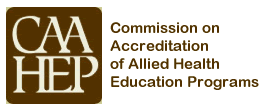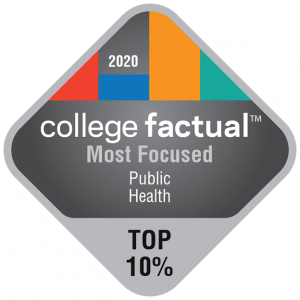Exercise Science/Strength and Conditioning Track
The nationally accredited (CAAHEP) exercise science/strength and conditioning emphasis provides students with a theoretical understanding of the anatomical, neuromuscular, physiological, and psychological responses and adaptations to exercise.
Through concentration-specific courses, electives, and internship, a health sciences (exercise science) degree provides students with the knowledge and skills to assess physical function and prescribe exercise for healthy individuals and special populations.
This emphasis in health sciences prepares graduates to:
- gain employment in a variety of settings as exercise specialists for youth, adult, geriatric, and special populations, including those with medically controlled diseases.
- work as business owners and communication specialists and successfully enter graduate and professional schools.
- sit for certifications offered by the American College of Sports Medicine (ACSM), including those for
- personal trainers and
- exercise physiologists
Student outcome data for 2022-23:
- Student retention rate: 93%
- Student graduation rate: 100%
- Positive placement rate*: 100%
*Positive placement rate defined as enrollment in advanced degree program, employment in professional/allied health, or military service
Students taking this emphasis are strongly encouraged to consider the 5 year accelerated B.S. to M.S. Program in Public Health Education and Promotion and should consult an advisor for more information.
Accreditation

The CAAHEP Accreditation Standards for programs in Exercise Science:
- Sponsorship
- Program Goals
- Resources
- Student and Graduate Evaluation/Assessment
- Fair Practices
Internship Prerequisites:
A cumulative grade point average of 2.0 or better; a grade of C- or better in HPR 202, HPR 301, and HPR 410; and a minimum of 12 credits earned at Marymount are needed to register for the internship.
Internship Requirements:
When other requirements are completed and minimum grade requirements are met, the student completes a 120-hour, three-credit internship.
Minimum Grade Requirement:
A minimum cumulative grade point average of 2.0 and a minimum grade of C- in BIO 151, BIO 151L, BIO 161, BIO 161L, BIO 162, BIO 162L, MA 132, PSY 110, HPR 202, HPR 260, HPR 300, HPR 302, HPR 304, HPR 307, HPR 410, and HPR 415.
Degree Requirements
This degree requires a total of 120 credits.
Liberal Arts Core and University Requirements
See University Requirements and the Liberal Arts Core for details. Health sciences (exercise science) majors will satisfy the three-course university Writing-Intensive (WI) requirement in the following way: All majors must take HPR 301 Health/Fitness Program Management and HPR 415 Exercise Guidelines for Special Populations. Majors must take an additional WI course from the Liberal Arts Core or as a university elective.
Major Requirements
To fulfill the requirements of the major, all students in this program will take the following coursework in a sequence determined in collaboration with a faculty advisor. Some courses also satisfy Liberal Arts Core and/or University Requirements (*).
| BIO 151 | General Biology I * |
3 |
| BIO 151L | General Biology I Lab * |
1 |
| BIO 161 | Anatomy and Physiology I * |
3 |
| BIO 161L | Anatomy and Physiology I Lab |
1 |
| BIO 162 | Anatomy and Physiology II * |
3 |
| BIO 162L | Anatomy and Physiology II Lab |
1 |
| HIM 115 | Medical Terminology |
3 |
| One (1) health and human performance activity elective |
|
|
| HPR 201 | Introduction to Health and Exercise Science |
3 |
| HPR 202 | Exercise Physiology |
3 |
| HPR 210 | First Aid and Safety |
1 |
| HPR 225 | Health Psychology * |
3 |
| HPR 260 | Introduction to Sports Medicine |
3 |
| HPR 300 | Essentials of Personal Training |
3 |
| HPR 301 | Health/Fitness Program Management * |
3 |
| HPR 302 | Fitness and Health Assessment * |
3 |
| HPR 304 | Developing Physical Training Programs |
3 |
| HPR 307 | Strength and Conditioning of Athletes |
3 |
| HPR 340 | Nutrition for Optimal Health |
3 |
| HPR 400 | Senior Internship * |
3 |
| HPR 406 | Stress Management * |
3 |
| HPR 410 | Anatomical Kinesiology |
3 |
| HPR 415 | Exercise Guidelines for Special Populations * |
3 |
| HPR 430 | Public Health Capstone * |
3 |
| MA 132 | Statistical Analysis * |
3 |
| PSY 110 | Human Growth and Development * |
3 |
Sample Degree Plan — Health Sciences (Exercise Science Emphasis)
Please note that this is a sample plan; all students must consult with an advisor in making course selections.
Year One — Fall
| BIO 151 | General Biology I * |
3 |
| BIO 151L | General Biology I Lab * |
1 |
| EN 101 | Composition I * |
3 |
| HPR 201 | Introduction to Health and Exercise Science |
3 |
| DSC 201 | New Student Seminar * |
1 |
| One (1) elective |
3 |
Year One — Spring
| EN 102 | Composition II * |
3 |
| TRS 100 | Theological Inquiry * |
3 |
| HPR 202 | Exercise Physiology |
3 |
| HIM 115 | Medical Terminology |
3 |
| One (1) health and human performance activity elective |
|
|
| HI | Introductory History (HI-1) core course * |
3 |
Year Two — Fall
| BIO 161 | Anatomy and Physiology I * |
3 |
| BIO 161L | Anatomy and Physiology I Lab |
1 |
| HPR 225 | Health Psychology * |
3 |
| HPR 260 | Introduction to Sports Medicine |
3 |
| EN | Introductory Literature (LT-1) core course * |
3 |
| One (1) elective |
3 |
Year Two — Spring
| BIO 162 | Anatomy and Physiology II * |
3 |
| BIO 162L | Anatomy and Physiology II Lab |
1 |
| MA 132 | Statistical Analysis * |
3 |
| PH 100 | Introduction to Philosophy * |
3 |
| Introductory Social Science (SS-1) core course (economics, politics, or sociology) * |
3 |
|
| One (1) elective |
3 |
Year Three — Fall
| HPR 301 | Health/Fitness Program Management * |
3 |
| HPR 302 | Fitness and Health Assessment * |
3 |
| HPR 210 | First Aid and Safety |
1 |
| PSY 110 | Human Growth and Development * |
3 |
| PH | Advanced Philosophy (PH-2) or Philosophical Ethics (PH-E) core course * |
3 |
| One (1) elective |
3 |
Year Three — Spring
| HPR 304 | Developing Physical Training Programs |
3 |
| HPR 406 | Stress Management * |
3 |
| One (1) writing intensive (WI) course * |
3 |
|
| Fine Arts (FNA), Advanced Literature (LT-2), or Advanced History (HI-2) core course * |
3 |
|
| One (1) global perspective (GP) course – HPR 308 recommended * |
|
Year Four — Fall
| HPR 300 | Essentials of Personal Training |
3 |
| HPR 307 | Strength and Conditioning of Athletes |
3 |
| HPR 340 | Nutrition for Optimal Health |
3 |
| HPR 410 | Anatomical Kinesiology |
3 |
| Advanced Theology/Religious Studies (TRS-2) or Theological Ethics (TRS-E) core course * |
3 |
Year Four — Spring
| HPR 400 | Senior Internship * |
3 |
| HPR 415 | Exercise Guidelines for Special Populations * |
3 |
| Fine Arts (FNA), Advanced Literature (LT-2), or Advanced History (HI-2) core course * |
3 |
|
| One (1) elective |
3 |






